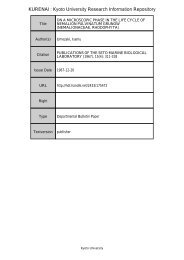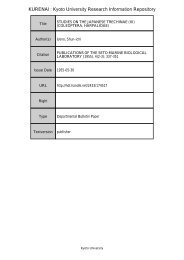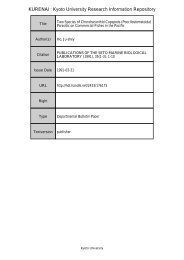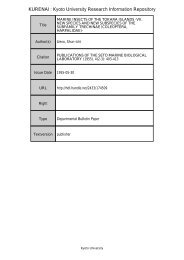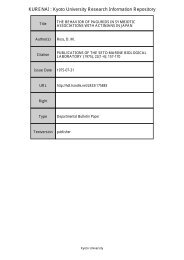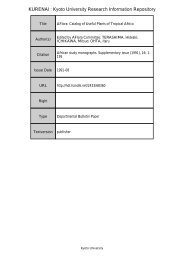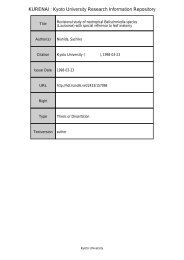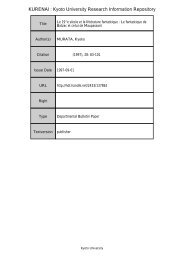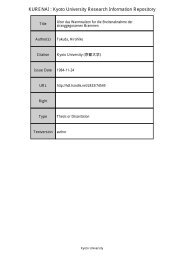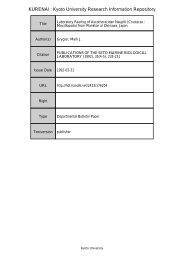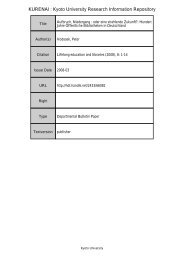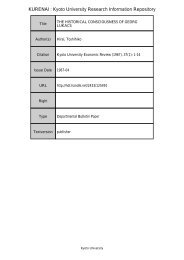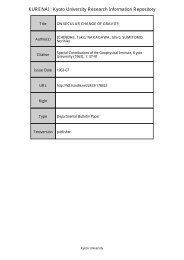Remaindered Life of Citizen-Man, Medium of Democracy
Remaindered Life of Citizen-Man, Medium of Democracy
Remaindered Life of Citizen-Man, Medium of Democracy
You also want an ePaper? Increase the reach of your titles
YUMPU automatically turns print PDFs into web optimized ePapers that Google loves.
東 南 アジア 研 究<br />
49 巻 3 号<br />
tastes and a desire for better things. The standard <strong>of</strong> living must be raised” [ibid.: 29]. 7)<br />
Discontent is the countermeasure to stagnation. It is the obverse <strong>of</strong> the progressive spirit that<br />
must be developed in the new citizen-subject, a spirit which is expressed in the demands and<br />
desires for better things and which enables life to be lived beyond the level <strong>of</strong> mere physical<br />
existence and mere family continuity. 8)<br />
From its inception, the U. S. imperial project <strong>of</strong> education entailed tutelage in calibrating<br />
this equation between political ideals <strong>of</strong> citizenship and economic ideals <strong>of</strong> capitalist<br />
accumulation, despite shifts and differences in particular policies. 9) During the beginning <strong>of</strong> his<br />
tenure as Superintendent <strong>of</strong> the Philippine Commission from 1903-09, David P. Barrows, for<br />
example, proclaimed: “Material benefits can neither be taken advantage <strong>of</strong> nor enjoyed by a<br />
people illiterate and ignorant. Development <strong>of</strong> markets and <strong>of</strong> trade only accompany higher<br />
standards <strong>of</strong> life, and higher standards <strong>of</strong> life proceed nowhere so quickly as from an advance in<br />
education.” 10) While Barrowsʼ Jeffersonian educational model for developing those higher<br />
standards <strong>of</strong> life through a more literary (rather than industrial) “character-training” education<br />
was short-lived, what is important to note is the emergence <strong>of</strong> the central tenet around which<br />
educational projects as well as other national projects organized their efforts, which is the idea<br />
<strong>of</strong> particular “standards” <strong>of</strong> life as universal measure and norm by which native life could be<br />
restructured in order to transform and elevate “the average” people into proper subjects <strong>of</strong><br />
democracy. 11) In this way, the U. S. imperial project <strong>of</strong> mass education, which other scholars<br />
have also described in terms <strong>of</strong> an “expansive, imperial project <strong>of</strong> sentimentalism” through<br />
which the full and complete extension <strong>of</strong> “humanity” to stigmatized others is facilitated [Wexler<br />
2000: 101], can be understood as the metaprogram for the “humanization” <strong>of</strong> colonial peoples<br />
according to the protocols <strong>of</strong> subjectivity embedded in the practices <strong>of</strong> what Marx and Engels<br />
call “a definite mode <strong>of</strong> life” [Marx 1989]. In this metaprogram <strong>of</strong> “humanization,” the very<br />
7) Osias <strong>of</strong> course assumes, in this ideological vein, that poverty results in a default individualist selfinterest<br />
at the expense <strong>of</strong> community.<br />
8) Hence, higher economic standards <strong>of</strong> living could serve as indicators <strong>of</strong> higher standards <strong>of</strong> life. Osias<br />
reproduces the table provided by Patten in The New Basis <strong>of</strong> Civilization, which lines up increasing<br />
income levels in the U. S. with terms <strong>of</strong> increasing civilizational value, or “the income graduation<br />
whereby men pass from one stage <strong>of</strong> progress to another: Dissolution, Poverty, Family Continuity,<br />
Economic Freedom, Economic Independence, Economic Initiative, Economic Leisure” [Osias 1921:<br />
30].<br />
9) Although Glenn May argues that the U. S. educational project in the Philippines was a failure (limiting<br />
himself to the period under study 1900-13, yet implying the failure <strong>of</strong> U. S. colonial policy more<br />
generally beyond this period), the goals he identifies as driving U. S. colonial policy more generally<br />
(and shaping educational policy specifically), i. e., to prepare Filipinos for citizenship and for<br />
productive labor, constitute colonial precepts that I would argue has animated and shaped much<br />
symbolic production, as well as the material organization <strong>of</strong> social life, in the Philippines since then.<br />
10) Quoted in LeRoy [1905: 231]. See also May [1984: 97-112]. Barrows subsequently became the ninth<br />
President <strong>of</strong> the University <strong>of</strong> California from 1919 to 1923.<br />
11) The notion <strong>of</strong> “standards <strong>of</strong> living” becomes a conceptual tool for students <strong>of</strong> “comparative<br />
humanity.” See Keesing [1935: 21-34].<br />
470




